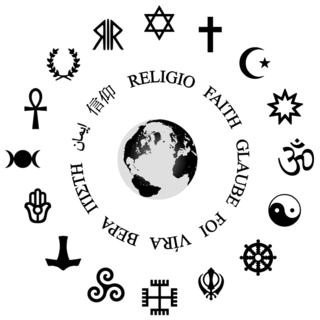See also
| Concepts in religion | |||||||||||||
|---|---|---|---|---|---|---|---|---|---|---|---|---|---|
| Conceptions of God |
| ||||||||||||
| Existence of God |
| ||||||||||||
| Theology |
| ||||||||||||
| Religious language | |||||||||||||
| Problem of evil | |||||||||||||
(by date active) |
| ||||||||||||
| Related topics | |||||||||||||
| Part of a series on the |
| Philosophy of religion |
|---|
| Philosophy of religion article index |
Articles related to philosophy of religion include:

The following outline is provided as an overview of and topical guide to religion:

Secular humanism is a philosophy, belief system, or life stance that embraces human reason, logic, secular ethics, and philosophical naturalism, while specifically rejecting religious dogma, supernaturalism, and superstition as the basis of morality and decision-making.

Religious humanism or ethical humanism is an integration of nontheistic humanist philosophy with congregational rites and community activity that center on human needs, interests, and abilities. Religious humanists set themselves apart from secular humanists by characterizing the nontheistic humanist life stance as a non-supernatural "religion" and structuring their organization around a congregational model.
Nontheism or non-theism is a range of both religious and non-religious attitudes characterized by the absence of espoused belief in the existence of God or gods. Nontheism has generally been used to describe apathy or silence towards the subject of gods and differs from atheism, or active disbelief in any gods. It has been used as an umbrella term for summarizing various distinct and even mutually exclusive positions, such as agnosticism, ignosticism, ietsism, skepticism, pantheism, pandeism, transtheism, atheism, and apatheism. It is in use in the fields of Christian apologetics and general liberal theology.
The existence of God is a subject of debate in theology and the philosophy of religion. A wide variety of arguments for and against the existence of God can be categorized as logical, empirical, metaphysical, subjective or scientific. In philosophical terms, the question of the existence of God involves the disciplines of epistemology and ontology and the theory of value.
Agnostic theism, agnostotheism, or agnostitheism is the philosophical view that encompasses both theism and agnosticism. An agnostic theist believes in the existence of one or more gods, but regards the basis of this proposition as unknown or inherently unknowable. The agnostic theist may also or alternatively be agnostic regarding the properties of the god or gods that they believe in.
Atheism is the rejection of an assertion that a deity exists. In a narrower sense, hard atheism is specifically the position that there are no deities, effectively taking the stance of a positive claim in regards to the existence of any goddess or god. The English term 'atheist' was used at least as early as the sixteenth century and atheistic ideas and their influence have a longer history.
This glossary of philosophy is a list of definitions of terms and concepts relevant to philosophy and related disciplines, including logic, ethics, and theology.
Criticism of atheism is criticism of the concepts, validity, or impact of atheism, including associated political and social implications. Criticisms include positions based on the history of science, philosophical and logical criticisms, findings in both the natural and social sciences, theistic apologetic arguments, arguments pertaining to ethics and morality, the effects of atheism on the individual, or the assumptions that underpin atheism.

Humanism is a philosophical stance that emphasizes the individual and social potential, and agency of human beings, whom it considers the starting point for serious moral and philosophical inquiry.

The following outline is provided as an overview of and topical guide to humanism:
The following outline is provided as an overview of and topical guide to atheism:
Atheism, in the broadest sense, is an absence of belief in the existence of deities. Less broadly, atheism is a rejection of the belief that any deities exist. In an even narrower sense, atheism is specifically the position that there are no deities. Atheism is contrasted with theism, which in its most general form is the belief that at least one deity exists.

Spiritual naturalism, or naturalistic spirituality combines a naturalist philosophy with spirituality. Spiritual naturalism may have first been proposed by Joris-Karl Huysmans in 1895 in his book En Route.
Coming into prominence as a writer during the 1870s, Huysmans quickly established himself among a rising group of writers, the so-called Naturalist school, of whom Émile Zola was the acknowledged head...With Là-bas (1891), a novel which reflected the aesthetics of the spiritualist revival and the contemporary interest in the occult, Huysmans formulated for the first time an aesthetic theory which sought to synthesize the mundane and the transcendent: "spiritual Naturalism".
Agnostic atheism or atheistic agnosticism is a philosophical position that encompasses both atheism and agnosticism. Agnostic atheists are atheistic because they do not hold a belief in the existence of any deity and are agnostic because they claim that the existence of a divine entity or entities is either unknowable in principle or currently unknown in fact.
The following outline is provided as an overview of, and topical guide to, theology.
Secular Buddhism—sometimes also referred to as agnostic Buddhism, Buddhist agnosticism, ignostic Buddhism, atheistic Buddhism, pragmatic Buddhism, Buddhist atheism, or Buddhist secularism—is a broad term for a form of Buddhism based on humanist, skeptical, and agnostic values, valuing pragmatism and (often) naturalism, eschewing beliefs in the supernatural or paranormal. It can be described as the embrace of Buddhist rituals and philosophy for their secular benefits by people who are atheist or agnostic.